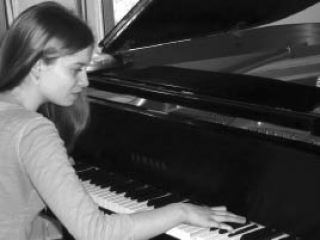The world of a 12-year-old exists on an ever-shifting plane of mundane, of-this-earth pursuits.
And dreams.
“I just go into this trance,” Catherine Edwards said. “I adore it.”
The thing, or rather, pursuit that transports Edwards into such a state is none other than her cello, an instrument that she saw her mother play as a tot and that she begged to try for herself practically as soon as she was able to ask.
One day, at the tender age of four-and-a-half, she arrived home to find a surprise sitting on the sofa, a cello of her very own. She’s been at it ever since.
Edwards’ story of musical discovery mimics that of four other young musicians who will appear at Bainbridge Performing Arts on Sunday in the next Declassified Chamber Music concert.
For instance, Laetitia Lehman-Pearsall, 16, doesn’t remember the first time she sat down at her family’s piano to play. But “apparently, I could just sit there for hours and watch,” she said.
Lehman-Pearsall and Edwards, along with Donna Horning and Amelia Keyser-Gibson, are currently working with instructor Peggy Swingle, whom series organizer James Quitslund credits with bringing the crop of five young musicians to this weekend’s concert.
Quitslund noted that typically, concerts are organized around particular musical styles or countries, recent examples being 19th century Paris and the Romantic period.
When conceiving Sunday’s performance of music from Britain and America, he “sent out the usual request for proposals to the usual people.”
“Boom,” he said. “Peggy Swingle had all these students.”
The Declassified Chamber Music series regularly incorporates student performers; Quitslund says these shows are always a series high point.
Even more fitting in this case – and the reason she responded so enthusiastically to Quitslund’s query – was that Swingle’s students happened to be working on pieces by both British and American composers when she saw Quitslund’s e-mail.
The program starts with the Elgar Quintet for Piano and Strings of 1917 and ends with American Irving Fine’s Partita for Woodwind Quintet of 1948.
In between are pieces that feature the students alongside the regular orchestra members, with a range of styles and centuries represented within the core theme.
“It’s an embarrassment of riches,” Quitslund said. “It’s wonderful. I’m thrilled.”
Horning’s description of Frederic Rzewski’s “Dreadful Memories,” a piece composed in 1978, reveals both her love for the piano – “my parents will tell you that I was fascinated by music since I was teeny” – and an impressive ability to articulate why and how, that love exists.
Highly contemporary, Horning says, the piece begins with snippets of pretty, Southern folk tunes including “Swanee River.” As it continues, the tone shifts, the folk vignettes twist into an angry, sinister crescendo, and the essence of the Civil War emerges.
“Things go badly awry, and you can really hear the battle in it,” she said.
As she plays, Horning says she envisions the music pouring out against a film, with a camera pulling back to reveal a panoramic scene of war-time destruction.
That complexity, not to mention that it’s just plain fun to play, take her somewhere completely different than her ordinary life.
“Over the years, what (music has) become is a luxury and an oasis,” Horning said. “Something that’s beautiful, and something you love to do.”
If Horning’s comments echo Edwards’ earlier ones about the power of music to transport, they also play off Lehman-Pearsall’s revelation that her pieces usually come with a mental narrative.
For the highly rhythmic, Afro-Cuban flavored “Souvenir de Porto Rico,” composed by Louis Moreau Gottschalk, Lehman-Pearsall envisioned two spies in a 1920s-era nightclub, each tasked with assassinating the other without knowing his face. The two snoops unknowingly circle each other, mimicking the music.
She made up the story before she even set her hands on the keys to play the piece.
“I know I really love it when I make up stories to go with it,” she said.
Quitslund isn’t surprised at the students’ level of savvy or confidence in describing music’s place in their lives. He’s known many of these young performers since they were little, and he’s seen them in other area performances.
“They’re tested,” he said.
A Bainbridge native himself, Quitslund said one of the reasons he loves to bring young musicians into his chamber fold is that he, too, was given opportunities to play with adults when he was growing up.
Unlike the teacher recitals that made him and his cohorts “nervous beyond description,” these types of cross-generation collaborations can boost performances on both sides, and show Bainbridge at its best.
“In involving young people like this, we like to show ourselves what kind of community we live in,” he said. “It’s not a self-congratulatory gesture; it’s a reminder that people in this community have not only extraordinary talents, but a responsibility.”



